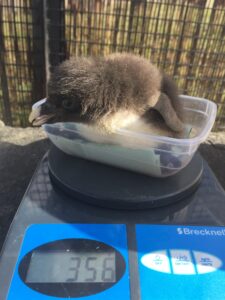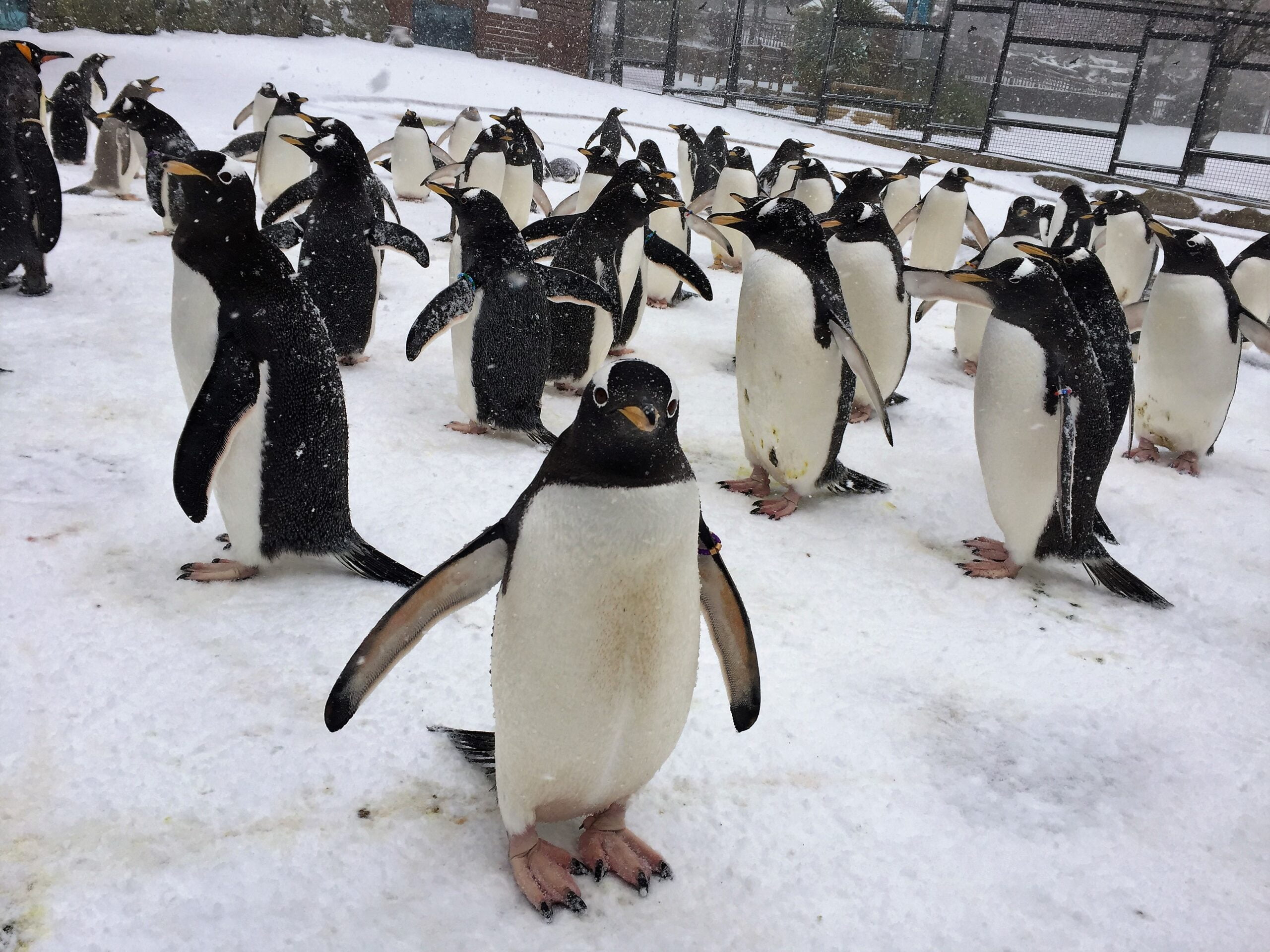Penguin Personalities and caring for Pelagic Pescatarians
Lorna Moffat has been caring for penguins for over a decade, working with captive populations of gentoo, king and rockhopper penguins in Edinburgh Zoo (Royal Zoological Society of Scotland). Her passion for penguins has even led her to the southern hemisphere to assist with research projects of wild penguin populations in the Falkland Islands.
With their funny waddles, tuxedo attire and charismatic personalities, penguins have been massively popular for decades. Depicted heavily in nature documentaries, cartoons, Christmas cards and movies, many people just imagine that there are millions of these birds in the southern hemisphere. Sadly, just like many other species , this is far from true.
Out of the 18 species of penguin, 12 are listed by the IUCN as experiencing some level of population decline with the New Zealand native yellow eyed penguin listed as critically endangered. All species face similar threats with the majority being human inflicted. Over-fishing has been a massive issue for years, depleting food sources for many animals and therefore having a detrimental impact on the marine ecosystem. If the fish numbers are low, it will impact the entire food chain, including penguins. Pollution is also one of the factors driving a decline in penguin numbers.
Like with most animals kept in captivity, good zoos and aquariums try to replicate wild environments to allow them to display natural behaviours, swim, breed, socialise, be provided with the correct diet, enrichment and medication when required. This means the facility should be following high welfare standards and ensuring that the 5 domains of animal welfare compromise are being considered and acted upon. This includes ensuring that penguins living under human care have access to a healthy, species-appropriate diet, good health care, an enclosure which provides opportunities for natural behaviours such as swimming, nesting, social interaction, and the overall physical and mental health of a colony which allows each penguin to thrive. Learning about penguins by witnessing how they live in the wild and comparing with captive conditions can also help ensure welfare standards are high.
In 2019 (life before the pandemic) I was lucky enough to be able to travel to the Falkland Islands to, not only see the birds I am passionate about in the wild (every keeper’s dream), but to research their breeding success and dynamics and compare this to captive populations (focussing on Gentoo penguins). I was also able to gather information like nesting material and nest site dimensions to help with captive husbandry. Research is a great tool for improving welfare, as well as being able to network with other keepers around the world via online groups, conferences, and workshops.
and compare this to captive populations (focussing on Gentoo penguins). I was also able to gather information like nesting material and nest site dimensions to help with captive husbandry. Research is a great tool for improving welfare, as well as being able to network with other keepers around the world via online groups, conferences, and workshops.
One thing I always tell people is that although they might all look the same, every penguin has a totally different personality – some are friendly, some are grumpy, some fling their fish when feeding and some greet you with a honk in the morning. By knowing everything about each individual bird, down to being able to identify them without their coloured flipper-band on, is a huge advantage. It also highlights that as autonomous individuals with particular wants and needs, their welfare is a priority.
Penguins are an aquatic species of bird, meaning that their enclosure should be based around a pool and the size of which should be reflected with the colony size – for example, Edinburgh Zoo has one of the largest outdoor pools in Europe for their 3 species of penguin; Gentoo, King and Northern Rockhopper; currently totalling 123 birds. Gentoos are the fastest species of penguin so having big pools allows them to zip around up to 25mph using their brush tail as a rudder.
Colony size is an important factor when holding penguins in captivity, as well as the size and depth of the pool and the dry land space available, is the fact as they are incredibly social birds, so the larger the flock the better. This is also important when you consider whole of life care for the flock and offspring because the construction, maintenance, filtration and diet of a colony is very expensive and welfare should not be compromised by financial constraints. Penguins are highly social, so having a good-sized colony is beneficial – being able to court with different potential partners, having a disagreement with a neighbour or having safety in numbers when rearing chicks – helping maintain the psychological health of the birds. Having seen Gentoos, Kings, Southern rockhoppers, Magellanics and Macaroni penguins in the wild in the Falkland Islands, it was refreshing to see that our penguins behaviours are the same, even though their numbers are obviously greater – same cheeky personalities, same nesting behaviours, flipper slapping fights, highly inquisitive chicks (and adults), all of which hopefully means we are achieving positive welfare outcomes for our penguins in captivity.
Many zoos in the UK house penguins in outdoor exhibits and although the UK is in the northern the climate is relatively similar to that of the Falkland Islands and other wild penguin ranges in the southern hemisphere. In the summer when temperatures do rise and the penguins get too warm, sprinkler systems are set up to give them (and sometimes us) the option to cool down. Being faced with the natural elements means that moulting should not be an issue with regards to lighting and time of the year, but it can impact diseases such as aspergillosis and malaria. Aspergillosis spores (Aspergillus spp) thrive in British soil and amalgamating that with the unpredictable weather (warm and dry one minute, warm and wet the next) means that birds are more susceptible and having dedicated keepers that know the first clinical signs of aspergillosis is a huge advantage! This is why veterinary support is an essential element of good animal welfare. The veterinary department get involved with diet plans, medical treatment, breeding management as well as faecal analysis, genetic testing and much more. I work in a zoo that is lucky enough to have incredible on-site vets that can be called on to check limps, possible aspergillosis, eye problems, monitoring of aging animals, assessing quality of life, and managing end of life care, as well as thorough chick checks during the breeding season.
Penguins eat fish – and smell like fish – that cannot be denied. Being piscivores, penguins should be fed a solely fishy diet and the species of fish they are fed is very important to being kept healthy. Wild birds eat a variety of sprats, cuttlefish, squid, and krill which can also be offered in captive populations, as well as other fish species which are safe and appropriate in size and nutrition. We have offered our colony their native diet but they seem to prefer the fatty and salty sprat over krill and squid, which offer behavioural enrichment opportunities over nutritional importance. Some nutrients can be lost during the defrosting process so additional supplements can be added in tablet form to help with thiamine deficiencies (vitamin B1) and fish eater tablets to add back in vitamin A and C to help with egg production.
People think working with penguins would be an easy job – feeding, cleaning, feeding, cleaning – but it is essential to have keepers that are passionate about the birds and know each individual feeding habits, preferred sleeping spots, previous illnesses etc. A lot more goes on behind the scenes such as intense record keeping, onsite research, hand-rearing chicks in unprecedented circumstances. It can be stressful, especially during breeding season, but the end results are healthy chicks and adult penguins which are able to exhibit natural behaviours in a naturalistic environment. Working with them so closely over the past 13 years has been a privilege, even if it does involve absolutely stinking of fish and covered in poop at the end of the day!
The views, opinions and positions expressed by guest bloggers are theirs alone, and do not necessarily reflect the opinions of Wild Welfare or any employee thereof. Wild Welfare is not responsible for the accuracy of any of the information supplied by the guest bloggers. We accept no liability for any errors, omissions or representations. The copyright of this content belongs to the author and any liability with regards to infringement of intellectual property rights remains with them.
Images © Lorna Moffat





